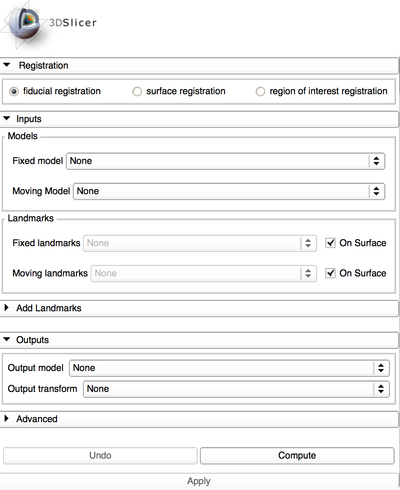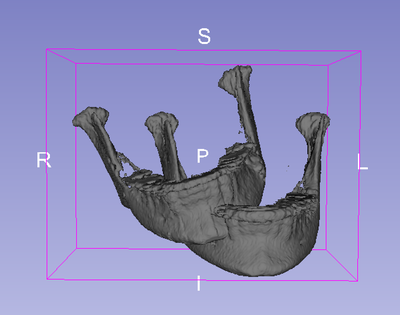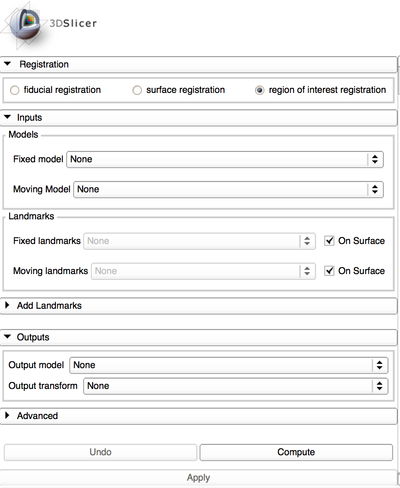Documentation/4.6/Modules/SurfaceRegistration
|
For the latest Slicer documentation, visit the read-the-docs. |
Introduction and Acknowledgements
|
Extension: CMFreg |
|
|
Module Description
This module allows the user to compute and apply transformations (registration) between two 3D models (VTK file). The registration can be computed using the entire mesh of both models (Surface Registration), just a region of interest (ROI Registration) on each model, or two fiducial lists which can be projected on the meshes (Fiducial Registration).
Use Cases
Fiducials Registration
Pictures
Inputs/Outputs
- Inputs:
- Fixed Model: 3D model (vtk file) that won't move.
- Moving Model: 3D model (vtk file) that will move.
- Fixed Landmarks: ordered landmark list (fiducial list) associated with the Fixed Model.
- Moving Landmarks: ordered landmark list (fiducial list) associated with the Fixed Model.
- Outputs:
- Output model: 3D model node that in which the transformed moving model will be saved.
- output transform: linear transform node in which the transformation computed by the algorithm will be saved.
Description
The fiducial registration computes a rigid, similarity, or affine transform from a matched list of fiducials using the SurfaceRegistration module. The algorithm needs the same number of fiducial in each list, and at least 3 fiducials per list.
The 'add landmarks' section allows the user to add and move landmarks. Landmarks can be projected on the surfaces or not.
Surface Registration
Pictures
Inputs/Outputs
- Inputs:
- Fixed Model: 3D model (vtk file) that won't move.
- Moving Model: 3D model (vtk file) that will move.
- Outputs:
- Output model: 3D model node in which the transformed moving model will be saved.
- output transform: linear transform node in which the computed transformation is saved.
Description
The fiducial registration computes a rigid, similarity, or affine transform to register two models using the Iterative Closest Point algorithm. This algorithm doesn't require the two models to have the same number of points.
ROI Registration
Pictures
Inputs/Outputs
- Inputs:
- Fixed Model: 3D model (vtk file) that won't move.
- Moving Model: 3D model (vtk file) that will move.
- Fixed Landmarks: list of landmarks associated to the Fixed Model.
- Moving Landmarks: list of landmarks associated to the Fixed Model.
- Outputs:
- Output model: 3D model that will save the result of the moving model after the transformation.
- output transform: linear transform that will save the transform compute by the algorithm.
Description
The fiducial registration computes a rigid, similarity, or affine transform from a matched part of models based on the Iterative Closest Point algorithm. This algorithm doesn't require the regions of each model to have the same number of points. The 'add landmarks' section allows user to define the regions of interest (ROIs) by positioning a landmark on a 3D model and defining a radius for the region (the radius is defined in term of neighbors and not in millimeters).
Similar Modules
N/A
Information for Developers
The source code is available on github









